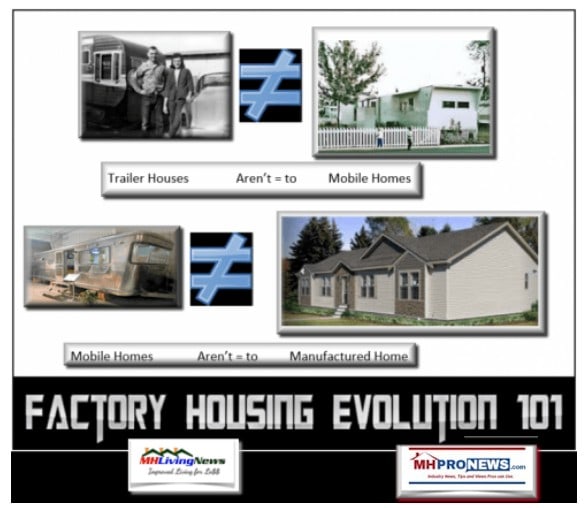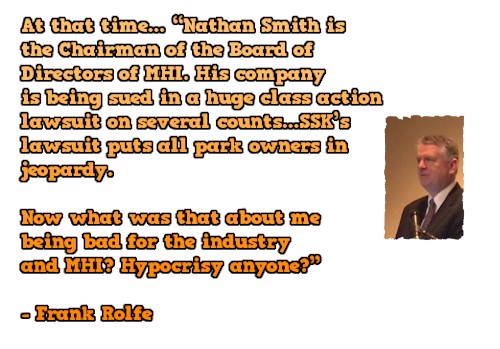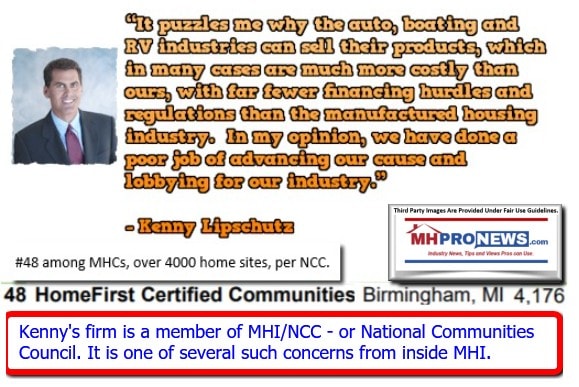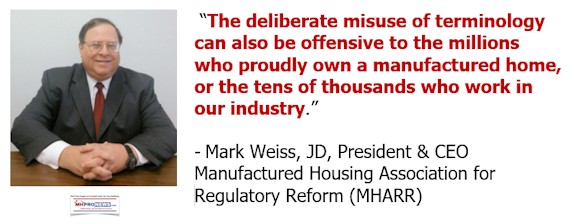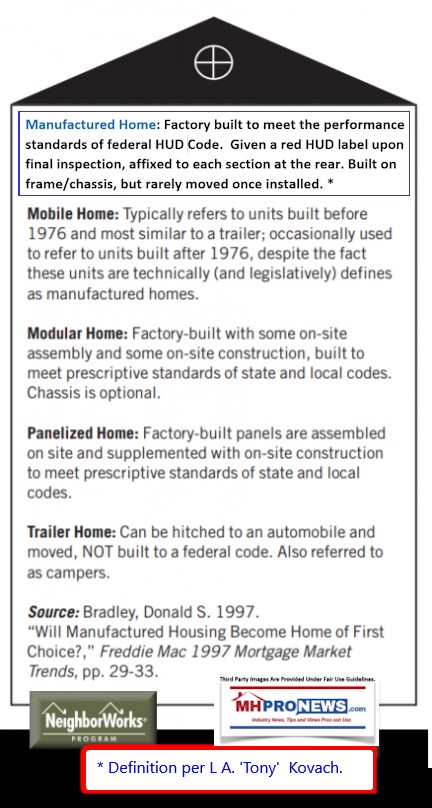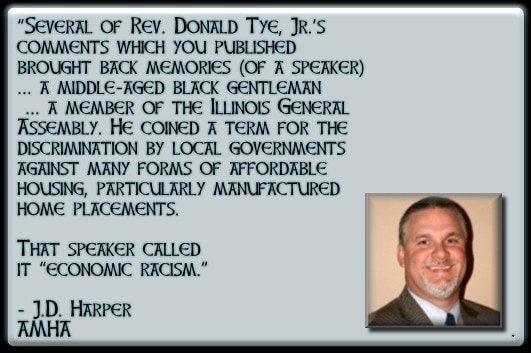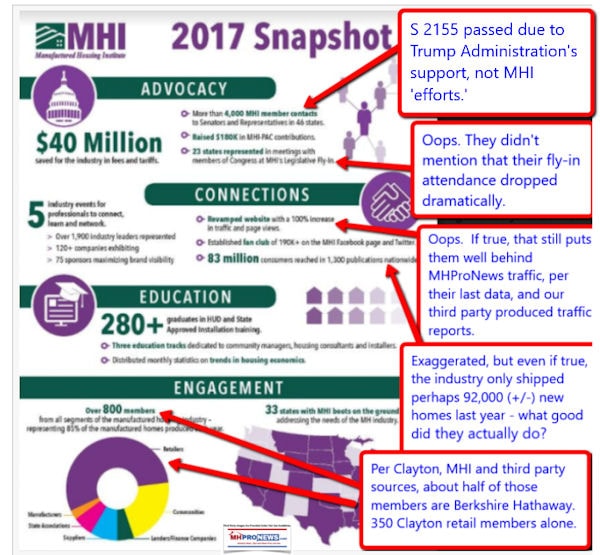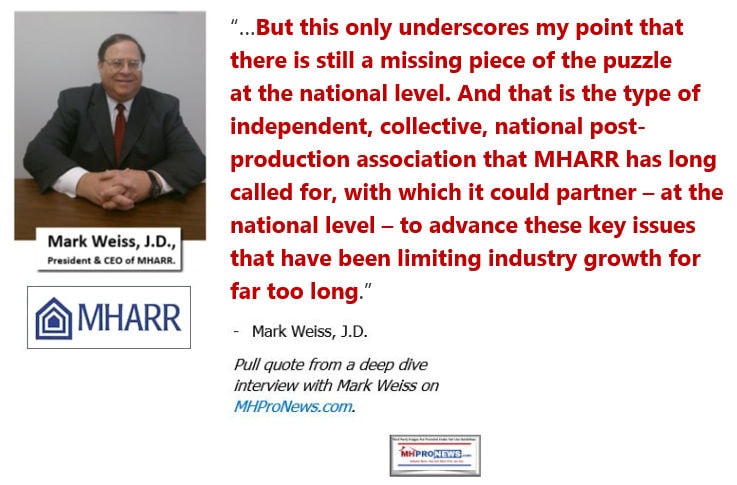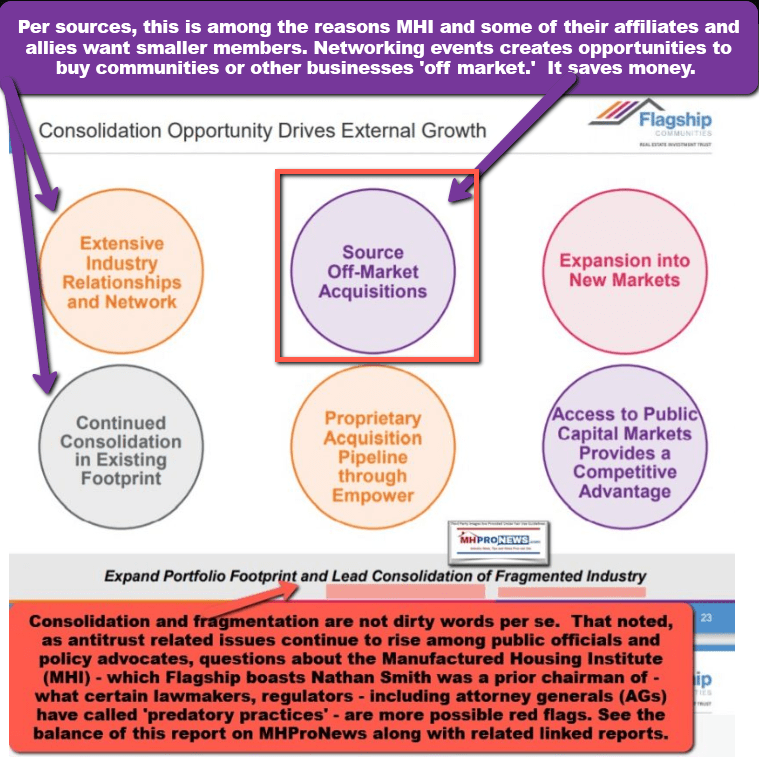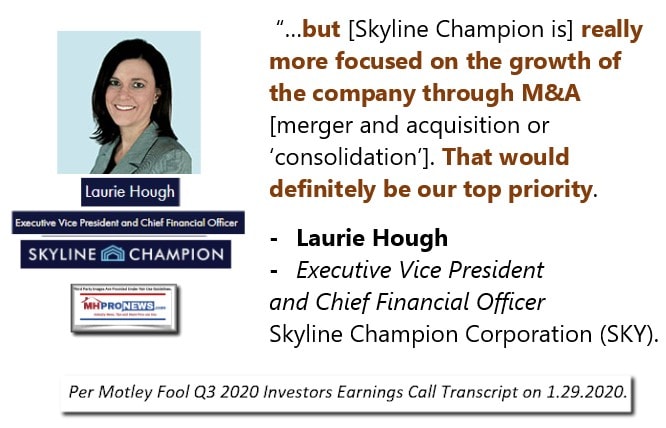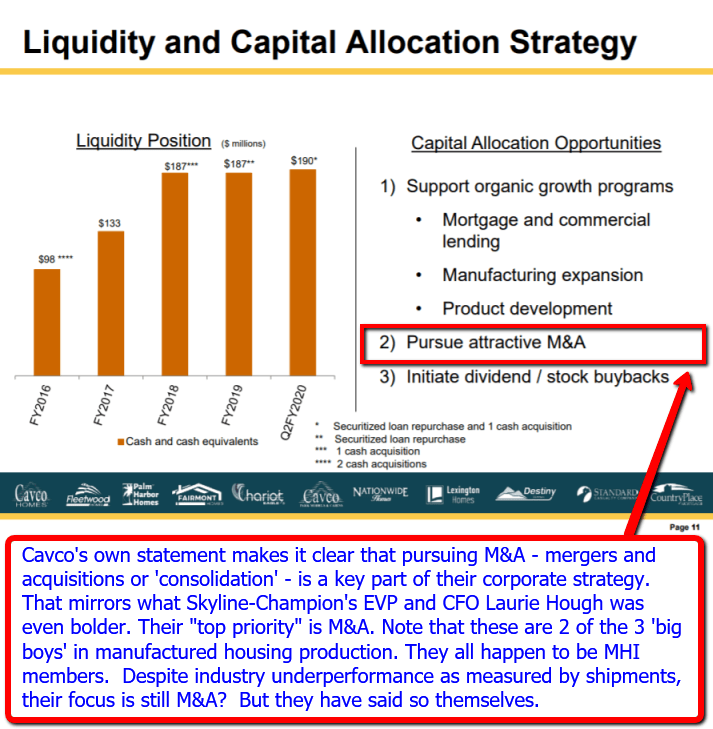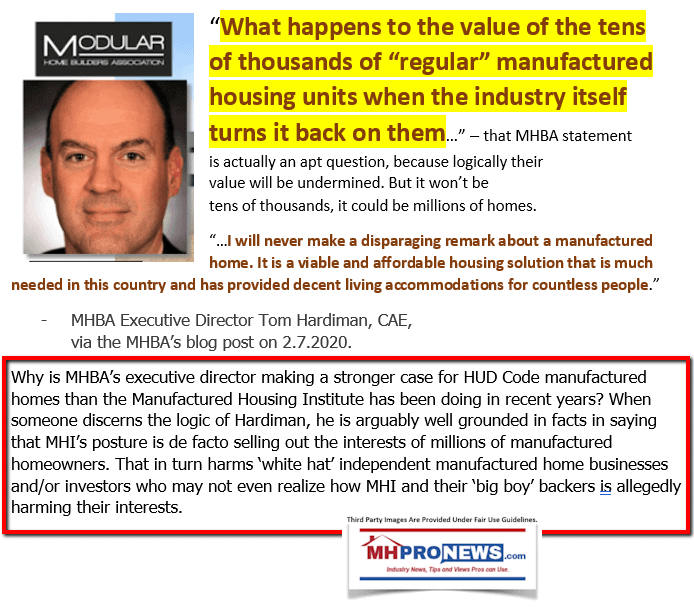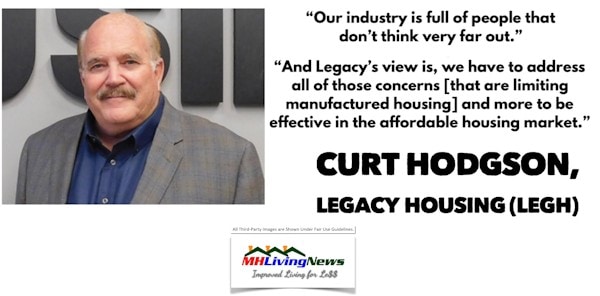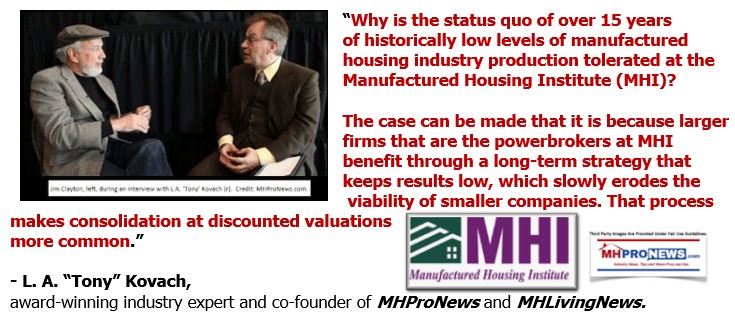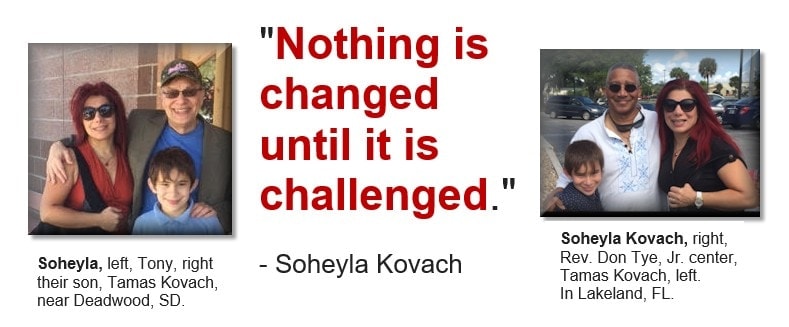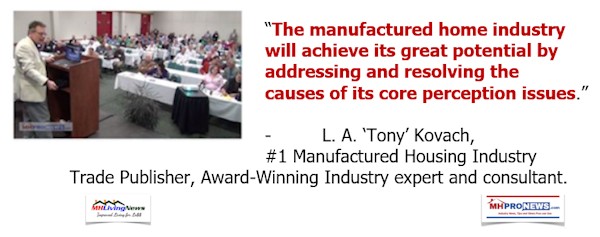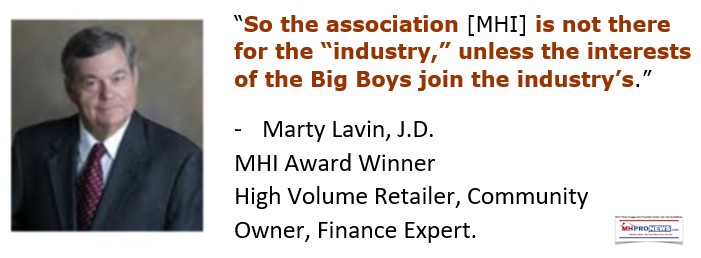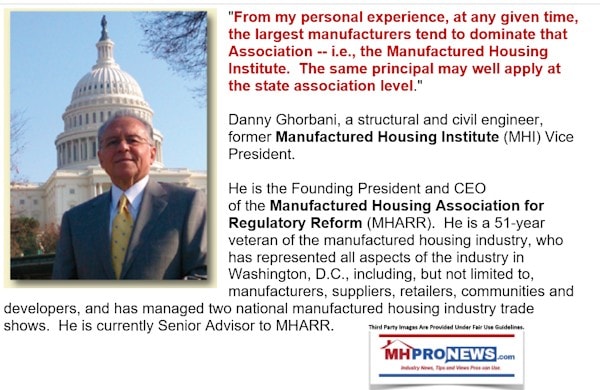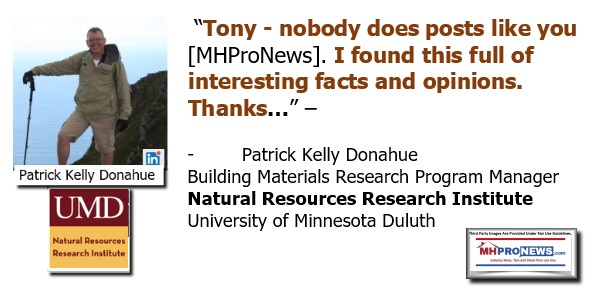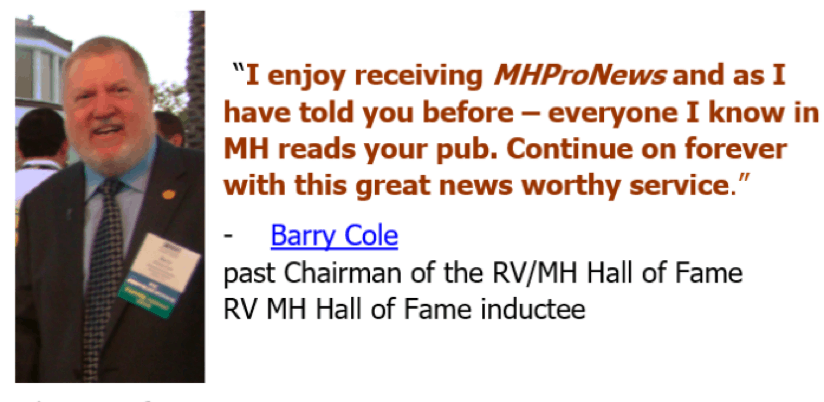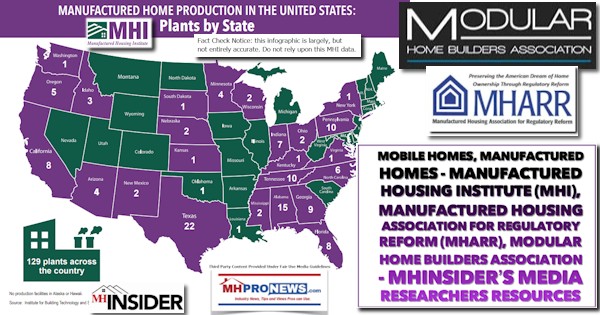
Mobile homes. Manufactured Homes. Manufactured Housing. Modular Housing. CrossModTM. Prefab Housing. Trailer Parks. Mobile Home Parks. Manufactured Home Communities. Right and wrong, these are just some of the terms used by media, writers, public officials, investors, researchers, and the home-shopping public that are looking into the factory-built home industry. Regarding national trade associations, on a practical level, there are three notable trade groups to explore. They are the Manufactured Housing Institute (MHI), the Manufactured Housing Association for Regulatory Reform (MHARR), and the Modular Home Builders Association (MHBA). There are dozens of states, plus other national professional trade groups too. But at least two national ones ostensibly engaged in manufactured homes and communities are essentially dormant at this time. Another is the Building Systems Council, a subset of the National Association of Home Builders (NAHB). Each of these organizations has its special features which may merit academic, regulatory, or media attention when someone is researching for articles, accurate information, or reports.
Each of those first three trade groups – MHI, MHARR, and MHBA – have unique missions, agendas, and track records. Researchers looking for objective information must take that background information into consideration.
In terms of trade media, based upon known data, MHProNews.com – this publication and our affiliated sister site, ManufacturedHomeLivingNews.com (MHLivingNews.com) – dominate on several levels. But in fairness, there are also bloggers and other trade publishers aplenty. More on MHInsider, ManufacturedHomes, and MobileHomeLiving later.
Does ranking on an internet search result reflect how important or useful a particular source is? “Not necessarily.” That is said as industry experts with well over a quarter of a century in this profession. There are some items that third parties listed herein are fine sources for specific information. But there are other sources – as this fact check will reveal – that regrettably can be poor sources for other items.
As reporters, editors, and newsroom producers know, many in media are often working with smaller staffs and thus limited time. Freelancers that are paid per article may understandably take the quick route, which in reporting on many professions or industries might be fine. But for reasons this report will explore, looking into factory built housing should not be approached as examining any other industry.
To set the stage for this topic, it helps to understand that several factors go into the formulas and algorithms that make up internet search engine results from Google, Bing, Duck Duck Go, or Yahoo. Among them are key words, the length of time online, a website’s traffic, and other search engine specific proprietary elements. Paid promotion via Google or Facebook can boost a given website’s ‘organic’ results. There are backlinks and other tactics that can be deployed for those willing to pay the price. But ‘buying traffic’ and other tactics that ‘game the system’ may increase exposure on certain page one search results, but a page one ranking does not necessarily translate into better, more accurate, or more dependable sources of information.
We’ll explore that and more below. That noted, on numerous subjects, without paying for Google or Facebook ads, MHProNews and/or our MHLivingNews sister site often appear in page one, or page one ‘top of fold’ organic search results. Third-party website metrics reflect that point that search engines are among the drivers of traffic to MHProNews.
With that brief introduction, stating the obvious can bring clarity to issues.
- There is widely-acknowledged affordable housing crisis. It would be hard to find a housing professional who doesn’t admit that the affordable housing crisis is real, and many would say it has been getting worse for years.
- Since manufactured homes and modular housing are both routinely lower-cost options when compared to conventional ‘on site’ built housing, one might think that such housing options are surging in popularity. Indeed, if you read articles by some of those mentioned in this report, they often give the mistaken impression that “manufactured housing is growing.” It may be so in a technical sense because more housing units are built than fall into disuse for whatever reason, thus, that could be called ‘growth.’ But in the normal terms that other housing resources such as the National Association of Realtors (NAR) or the National Association of Home Builders (NAHB) utilize to measure growth – month over month (MoM), year over year (YoY) increases or drops in housing sales – manufactured housing has regrettably been in statistical decline for most of the past two years.
- Says who? The Manufactured Housing Association for Regulatory Reform (MHARR), which in turn cites official data produced by IBTS for the U.S. Department of Housing and Urban Development (HUD).
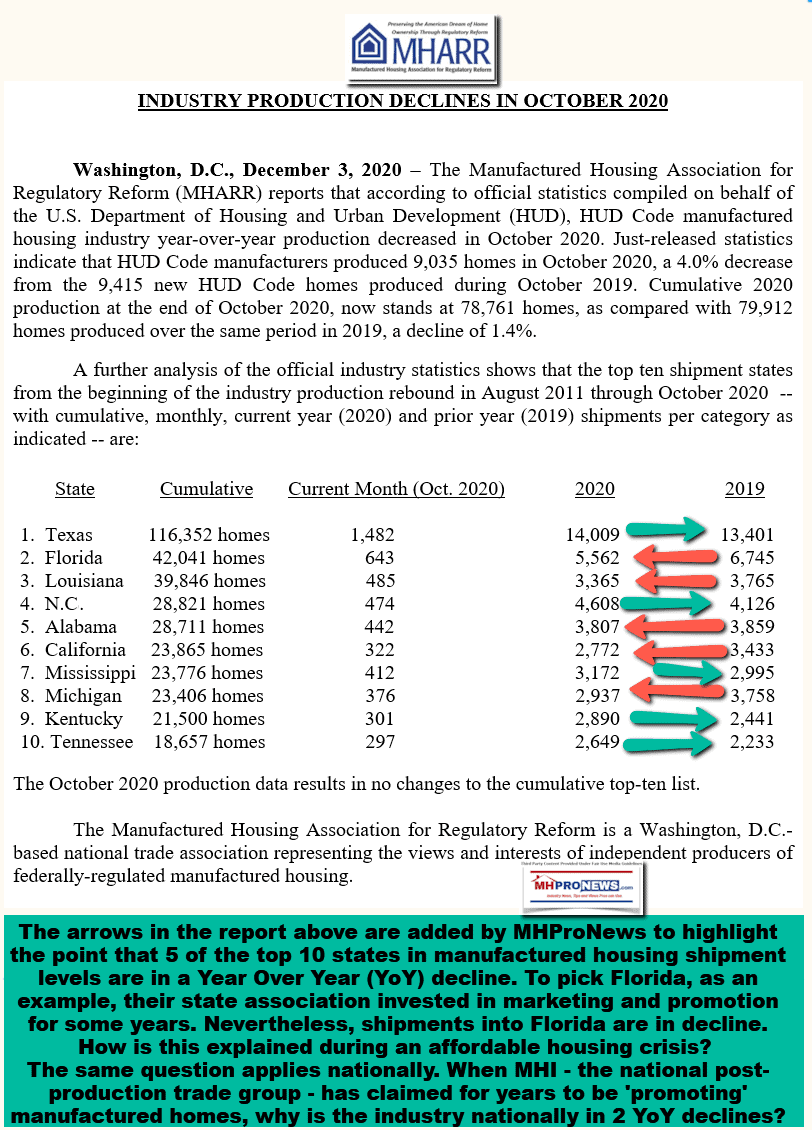
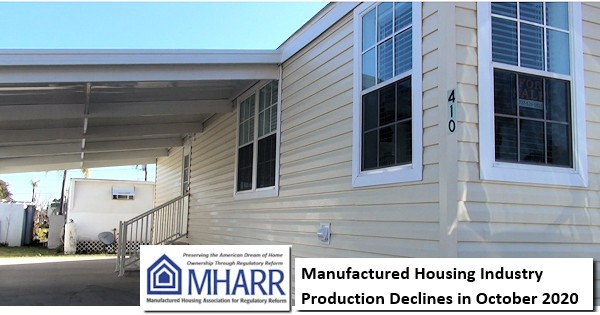
MHARR – or for that matter, MHProNews – each publishes a monthly report open to the public for reading and reference regarding new HUD Code manufactured home shipments. MHARR has done so for years. The most recent such report from MHARR is the one linked above.
By contrast, at the time of this report, MHI put such monthly industry production and shipment information under a password-protected, member-only login. By contrast, the NAR, NAHB, and MHARR all make similar information public. Why does MHI ‘hide’ their information when others make similar data available for researchers?
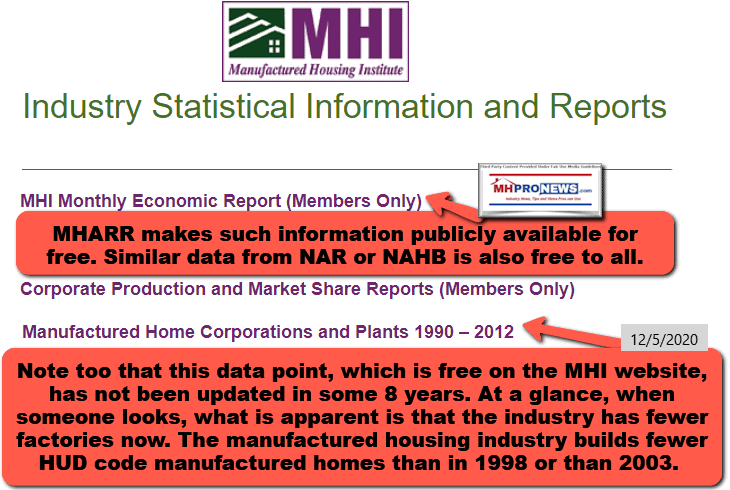
At a glance, the MHI website looks much like other trade groups. It has been in existence for decades. Because the MHI website has been online for over 20 years, it has a ‘ranking’ advantage over others like MHARR that are newer online. MHI’s Form 990 data also suggests that they pay sizable sums of money for their internet, tech, and related services. These are logically aimed, in part, to get and keep a higher ranking on various internet searches.

Unless someone is familiar with the details, history, and nuances of manufactured housing industry information, it is easy for professionals and newcomers alike to look at the MHI website and take the information at face value. People who do so are judging the book by its cover. But as the fact checks and linked research that follows reflects, the case can be made that MHI is at this time not a typical trade group.
Unfortunately, there is an argument that follows that MHI ‘plays with some numbers,’ data, claims, and relevant information. Those questionable or inaccurate bits of information can in turn be picked up by researchers and media. By contrast, MHProNews is not aware of similar controversies regarding NAR, NAHB, MHARR, MBA, or MHBA, to name a few housing or factory-built home-connected trade groups. For clarity, let’s stress that not all that MHI does is inaccurate. But there is enough problematic claims on the MHI website where often only an expert can sort through what can be trusted and what is to be questioned or ignored. Furthermore, as attentive readers will notice, there are sound third-party research documents and reports that for whatever reasons MHI has opted not to make public on their website.
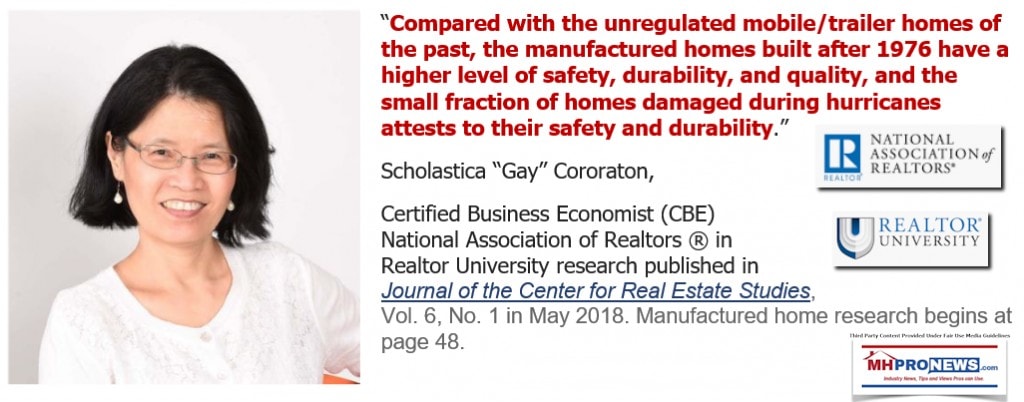
During an affordable housing crisis, and with manufactured home sales sliding, one might think that MHI would be robustly engaged with media, public officials, and researchers to correct every mistake. That would not be untypical for a professional association that is supposed to defend and promote the interests of their industry. For a parallel example, part of the raison d’être for the NAACP or the Anti-Defamation League (ADL) is precisely to step forward publicly and defend the interests of specific minority groups. In years gone by, MHI used to perform a similar function, addressing at times certain public misinformation.
Indeed, a prior chairman of MHI, Tim Williams, president and CEO of Berkshire Hathaway owned 21st Mortgage Corporation, said that there is a good argument to be made that MHI should defend and refute every piece of misinformation.
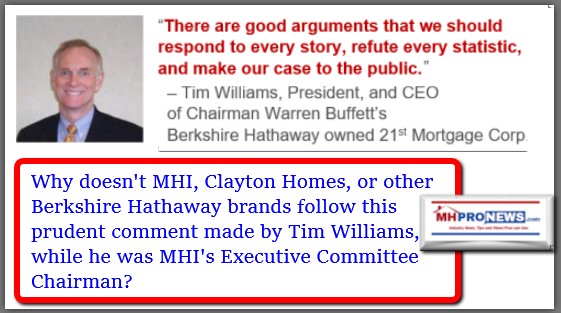
Following such comments by Williams, posted above, MHI hired a public relations professional. But on every follow-up performed by MHProNews in recent years with numerous media, public officials, academics, and others who published inaccurate information, neither the MHI public relations person, nor any others associated with MHI – per the journalists, editors, writers, news directors, or other officials expressed to MHProNews – ever said that MHI called or emailed them about errors. That would include errors ranging from terminology, industry data, regulations, or other issues of interest.
Not once in years of numerous outreaches performed by MHProNews did any such follow-up to see if MHI was doing their stated job of promoting and defending the industry resulted in a statement akin to, ‘yes, thank you, MHI followed up with us and told us that X, Y, Z was not accurate and merited correction.’
So, Williams as a former chairman of MHI is in the odd circumstance of having said that it would be logical to “respond to every story, refute every statistic, and make our case to the public,” yet the trade group he headed and is still a board member of – Arlington, VA based MHI – has not done so. Or at least not at a level that has yet been discovered in numerous spot-checks performed by MHProNews over the years. Indeed, initially, MHProNews could address MHI and ask them to do such a service as Tim Williams – their former chair and current board member – suggested. Still, nothing, per every source we checked.
It is not just MHProNews that has made this type of stunning observation, given that manufactured housing is underperforming during an affordable housing crisis.
Frank Rolfe, who-it should be noted-is a controversial figure in his own right, has both politely and at times sharply blasted MHI for failing to properly engage with the news media.

Furthermore, again noting that Rolfe is a controversial MHI/National Communities Council (NCC) member in his own right, publicly ripped another former MHI chairman for the problematic behavior that Nathan Smith arguably engaged in that resulted in lawsuits and several media black-eyes.
So, MHI and non-MHI members of the manufactured housing industry have publicly ripped the Arlington, VA based trade group. Others, including current and past MHI staff, have done so before and since off the record to MHProNews too.
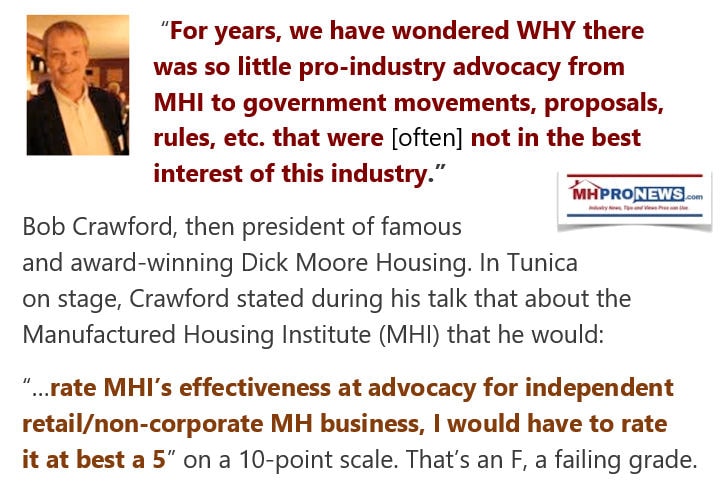
Note that Rolfe obliquely admits that he too has a problematic reputation.
It is a hard to escape the conclusion that Senator Elizabeth Warren (MA-D) and others alleged, that these are firms involved in predatory practices. For someone who spends even a few hours researching Impact Communities, Mobile Home University, or a prior brand – RV Horizons – that Rolfe and his partner Dave Reynolds are involved in. They’ve made this a successful business model, but as this Guardian news video below illustrates, they apparently have a poor reputation.
While the next video below is satirical in nature, the popular HBO show, Last Week Tonight with John Oliver went viral in April of 2019. Oliver’s language is often vulgar, and there is hyperbole in what follows, by it is also laced with hard reports by third-party researchers and news organizations. Put differently, Oliver framed a report that names Warren Buffett, Clayton Homes, their affiliated lending, Frank Rolfe, and other community operators. While not specifically named, one of Nathan Smith’s residents is part of a news clip back when Smith’s company was known as SSK Communities.
After years of publicity and complaints so problematic that it earned them an “F” rating by the Better Busines Bureau (BBB), Smith and his partner Kurt Kenny, rebranded SSK Communities as Flagship Communities.
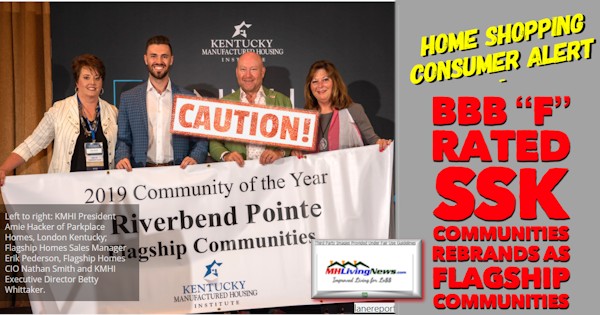
More recently, around the time of the death of their former partner Alice Sparks (Sparks, Smith, Kenny = SSK Communities), Smith and Kenny took Flagship Communities public.

Additional Information, MHProNews Analysis and Commentary
Recently, two different trade publications were contacted by MHProNews regarding reports that they had done that specifically mentioned aspects of manufactured housing and/or MHI. As is sadly often the case, there was a mix of accurate and inaccurate information. Not to embarrass either media source at this point, this writer reached out on behalf of MHProNews. As is often the case, MHI reportedly did not make any follow-up efforts after they published their respective reports, each of which had demonstrably misleading or inaccurate information.
One of the writers MHProNews followed up with was thoughtful and caring enough to not only email a response, but to call to discuss our concerns about her article. Let’s note for now that the other publication followed up by email. Each thanked us for bringing certain issues to their attention. If they will do something with that information is another question. Time will tell.
That noted, the writer who called to discuss our concerns with claims made in her report was asked certain questions. For instance:
- Did she contact any other trade group involved in manufactured housing?
- Was she aware of certain disturbing mainstream media reports about Clayton Homes, or other MHI member companies?
In each case, the reply to most of our inquiries was no. Thus, a writer for respected publications published articles that were arguably laced with inaccurate information.
To demonstrate that MHProNews and those cited herein are not alone in this concerns, a partial list of some mainstream media reports that have spotlighted legal and ethical concerns that often involved larger MHI member companies are found below.
- The Nation – Feb 15, 2018 – Special Investigation: The Dirty Secret Behind Warren Buffett’s Billions ….. Berkshire Hathaway subsidiaries Clayton Homes…,
- Forbes – Warren Buffett’s Exploitative Mobile Home Investment(note the terminology is in error, but the points made are to be taken seriously),
- Seattle Times – Federal officials investigating practices of Warren Buffett’s lending practices at Clayton Homes…,
- The Atlantic,
- Jacksonville Florida Times Union – John Oliver’s recent video slamming predatory businesses…involving Clayton Homes…MHI members…,
- GuruFocus – Warren Buffett Can’t Escape Unethical Strategic ‘Moats‘…Clayton Homes…,
- and antitrust-focused Open Markets.
There are numerous others who have reported on aspects of various scandals, market manipulation, predatory and deceptive trade practices, federal investigations, public officials, consumer, legal, and other complaints.
Additionally, there is the ‘smoking gun’ evidence of a purported prima facie antitrust against Buffett, Kevin Clayton, Clayton Homes, 21st and related RICO concerns linked here, and the now widely read “Case Against Clayton Homes,” linked here. For instance, while the Forbes article on racial bias and predatory behavior linked above has had on this date less than 20,000 views, the Case Against Clayton Homes linked here reportedly gets 100,000 plus hits monthly.
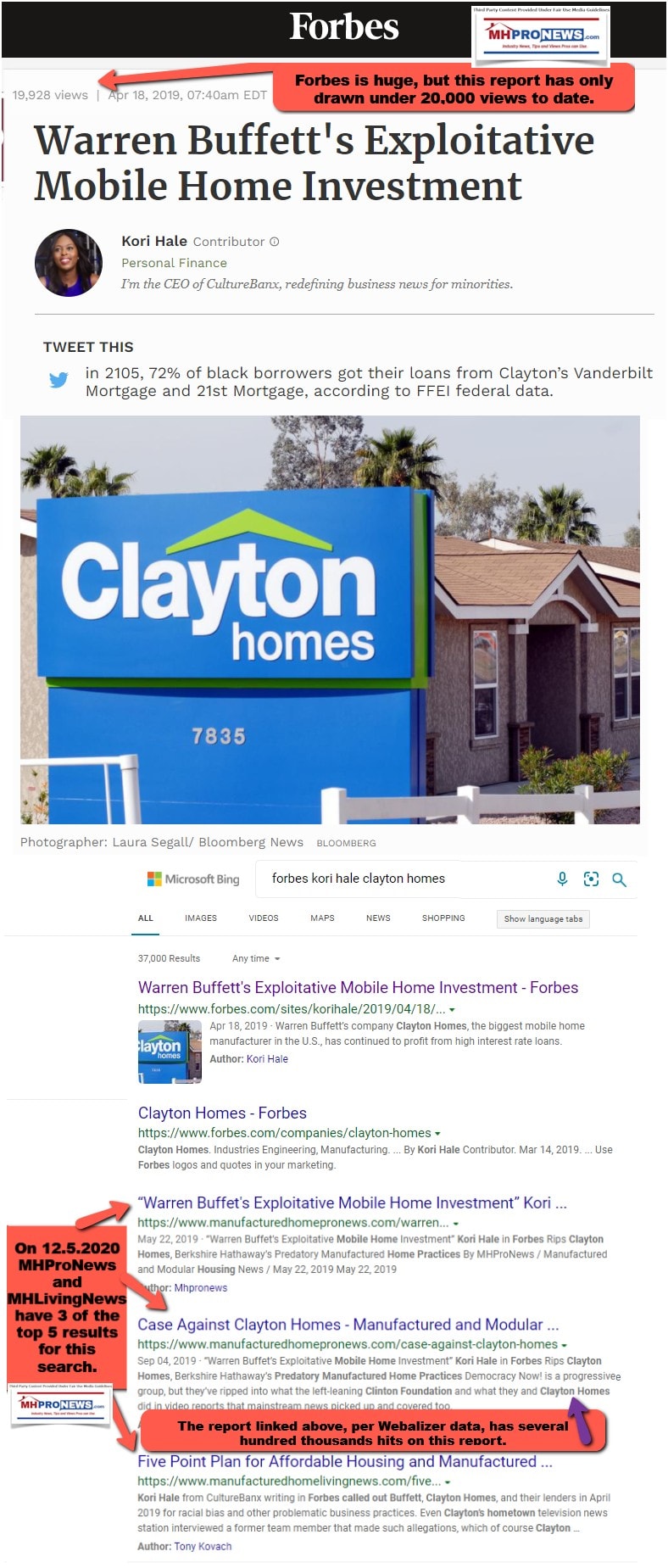
The third-party writer mentioned after ‘researching’ manufactured housing mainly through the lens of MHI and MHI-connected brands was clearly unaware of any of these scandals.
As one more point of embarrassment for MHI and their arguably dominating companies, since their chairman Don Glisson stepped down, every chair at MHI since Glisson has personally and/or at their corporation been involved in serious scandals reported in mainstream media and/or MHProNews or MHLivingNews.
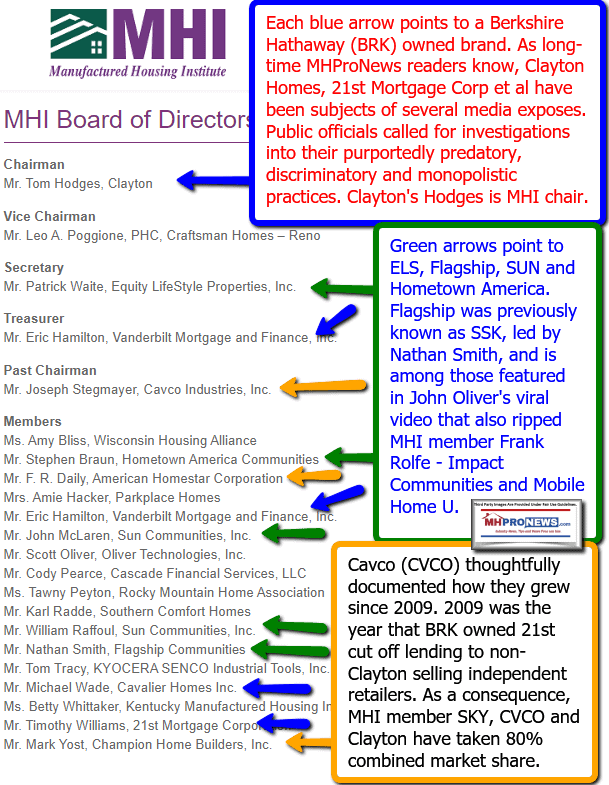
Once more, in fairness, that is not claiming that everything that these MHI members have said or done is bad, nor that everything that MHI or their NCC division has done is problematic. As with all people and things, there are often some positive qualities. That noted, this writer is not aware of any similar levels of scandals involving the housing trade groups mentioned – MHARR, NAHB, NAR, MHBA, etc. As but one example, MHI CEO Lesli Gooch, Ph.D. had an MHI whistleblower drop documentation of serious conflicts of interest to MHProNews, which was reported in a series of articles, once of which is linked below.

What did MHI board members do in response to documented evidence of conflicts of interest? Apparently, nothing. Gooch remains MHI’s CEO.
How Does MHI and Their Key Members Get Away With It?
The case can be made that there is a circular mutual admiration society that has been forged between key MHI member/brands and MHI.
MHI has a code of ethical conduct, see that, linked here. Some of the behavior that has been reported by MHProNews and or on our MHLivingNews sister site appear to be in clear violation of that MHI code of ethical conduct.
But sources inside or connected with MHI – including a board member and VP – have told MHProNews that there are no apparent instances of MHI exercising that code of conduct that could cause a problematic member to be expelled.
That noted, here is how ‘the game’ works in MHVille.
- MHI supports MHInsider, and MHInsider supports MHI. A close look at the MHInsider masthead reveals and documents those mutual ties. At a glance, MHInsider appears to be a legitimate and slick third-party publication. But upon closer examination, it is arguably a series of puff pieces designed to make some person, company, or MHI look good to the outside world.
- It should be noted that MHInsider’s traffic is terrible, per their own ‘views’ data. After MHProNews spotlighted several problematic reports in MHInsider, and also showed their readership data, MHInsider – in apparent embarrassment – stopped publicly providing that information. Yet, they have the chutzpah to claim without serious evidence that they are the industry’s leading publication. See the report linked here, which also has links to other examples.
- ManufacturedHomes is a website that has developed positive SEO, and they have a talented team. However, not unlike MHInsider, they don’t share their actual traffic on their blog posts that they claim as ‘news.’ They have, at times, implied that they get great traffic, but if so, then how does one explain that manufactured housing industry shipments are down two years running? After all, the raison d’être for ManufacturedHomes is promotion of the industry and/or specific industry brands. But logically, if they are successful at their high-priced services, then why isn’t the manufactured housing industry growing?
- MobileHomeLiving is an interesting platform that focuses a lot on remodeling, updating and handy man work on mobile and manufactured homes. They have good SEO. Their terminology is routinely improper. That have at times reportedly been surrogates for MHI. On their core topics of remodeling and updates, it is an interesting site. However, for accurate information about modern manufactured homes, someone must look elsewhere. For instance, they and Frank Rolfe alike routinely misuse manufactured housing terminology. A pair of guides to terminology are found below.
There are other bloggers and resources beyond these, but they are routinely thinly-veiled self-promotion or promotion of their clients.
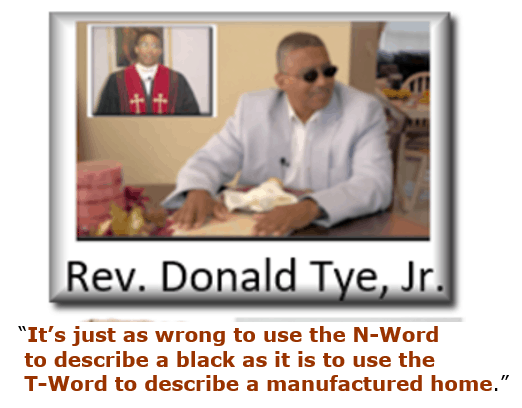
Based on the known data, all of these other ‘professional’ blogging and trade platforms that focus on manufactured housing are only a small fraction of the traffic and engagement of MHProNews. That is not bragging, it is merely a statement based upon known factual evidence. None of our would-be rivals have publicly challenged that claim in years.
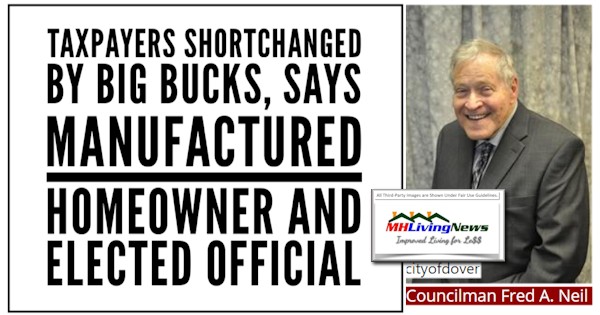
The problems inside manufactured housing are serious and real. When someone looks at content created by homeowners’ groups, they routinely point to problems with major MHI member companies. They may not always say so explicitly, but when a careful look is made, the case has been made that much of the ‘bad news’ generated about manufactured housing can be traced back to MHI member brands. MHI and those brands have been asked about that, and neither they nor their attorneys have publicly challenged those allegations.
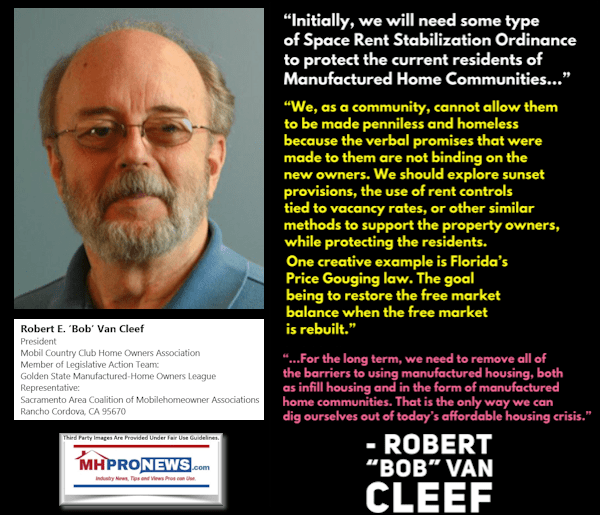
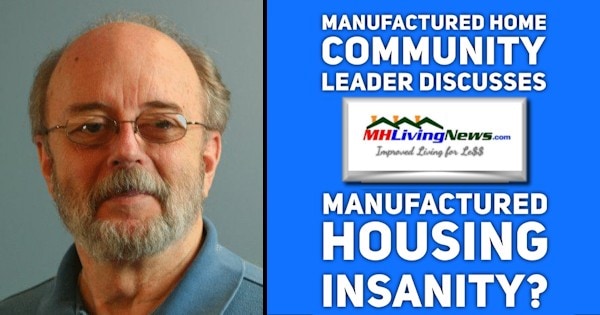
The Good News About Manufactured Housing as a Solution for the Affordable Housing Crisis
Ironically, MHI has developed – arguably under pressure from critiques by MHProNews, MHARR, and other industry members – some resources that are reasonably good. When asked, they may point to those resources. One example is linked below.
But when closely examined, the fine video above they have produced have very few views. By contrast, negative news media coverage videos often dwarf the number of views reported on YouTube.
Is Clayton Homes and MHI going to claim that they have seriously promoted the industry? They arguably have the resources to do so. Yet, most MHI videos do not have nearly as many views as this local newscast posted above. That video has been watched thousands of times, and slams Clayton Homes and their related lending for purportedly predatory practices which has reportedly drawn federal investigations.
MHI member company leaders at times admit that the industry is misunderstood.
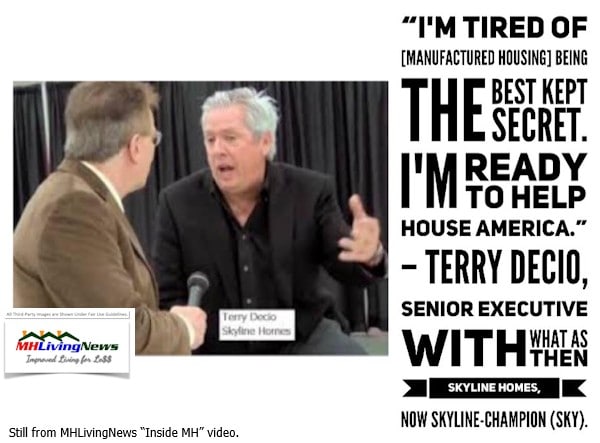
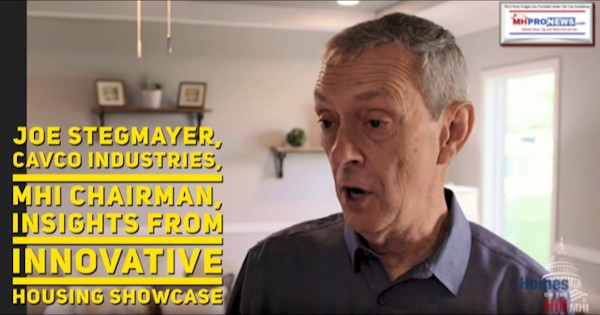
MHI state affiliates walk a fine line, because in some cases they may supply MHProNews with useful information off the record, but publicly they ‘support’ MHI. Yet they too have to admit at times to mainstream media and others that MHI’s efforts are not successful.
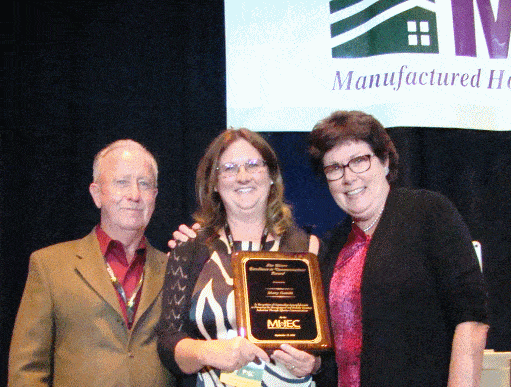
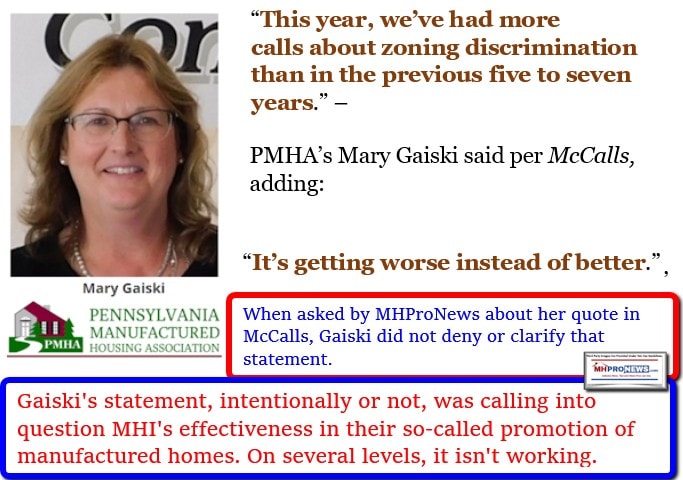
These issues don’t begin to probe serious controversies that industry insiders and those who read MHProNews or MHLivingNews on a regular basis are familiar with, but which are virtually unknown beyond the ‘borders’ of manufactured housing.
Among these issues are, in no particular order of importance:
- The full and proper implementation of the Manufactured Housing Improvement Act (MHIA) of 2000 (sometimes called the 2000 Reform Law).
- The full and proper implementation of Duty to Serve Manufactured Housing passed into law as part of the Housing and Economic Recovery Act (HERA) of 2008.
- The controversies surrounding the Clayton Homes backed “CrossModTM homes,” which known data reveals has had scant sales for two years. Indeed, the sales have been so low that the Government Sponsored Enterprises (GSEs) have asked to back up their commitments on manufactured housing connected DTS programs, save on lending for land-lease communities.
- A growing uproar from residents of land-lease communities which are often MHI members. MHI claims resident satisfaction, which has a measure of truth. Recently, a resident of RV Horizons called MHLivingNews, looking for information to help her address concerns with water quality at her land-lease community. She said she loves her manufactured home, but also said that she and others are unhappy with RV Horizons. It is nuances like that which other trade sources or MHI ignore. But aren’t those and other common resident concerns worthy of closer examination?
- A mix of accurate, inaccurate, and misleading information, often within a few inches of each other on the MHI website.
- While MHARR publishes their emailed news items on their website for the public to see, MHI rarely does so. Statements made in MHI ‘news and updates’ or MHI ‘housing alerts’ are often fact-checked by MHProNews and are demonstrated to have inaccurate or even self-contradictory information. Something similar can be said about MHI’s self-promotion video, a screen capture of which is shown below.
MHI 2018 claims about ‘promotion.’
As but one example of how MHI – sometimes from links just inches away from each other on their own website – publishes inaccurate or data debunked at times by their own members. One example of many is the manufactured home ‘community count controversy.’
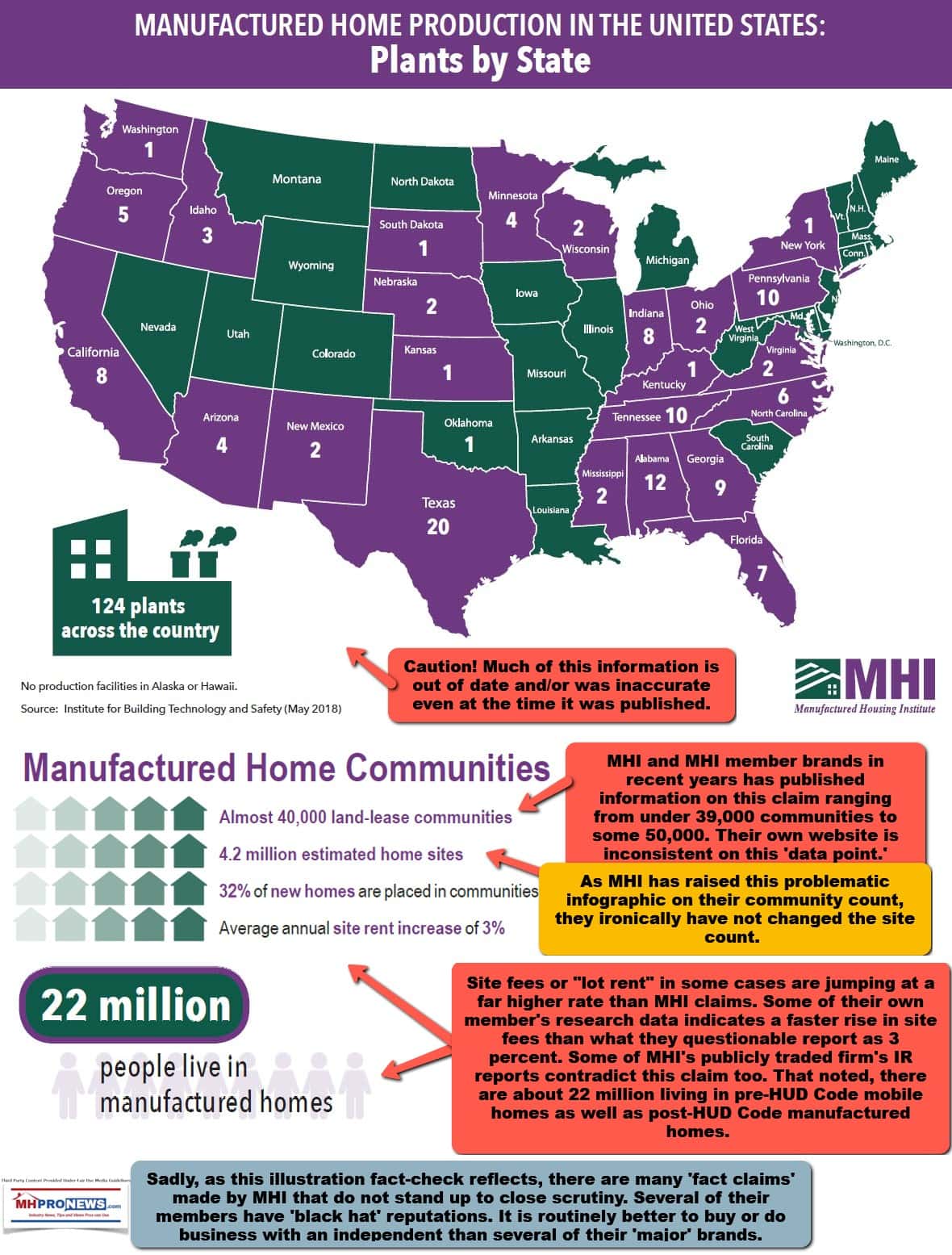
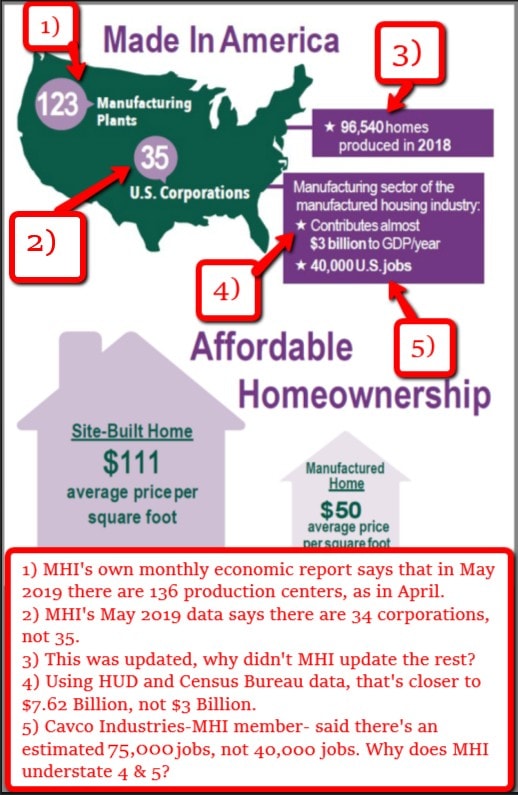
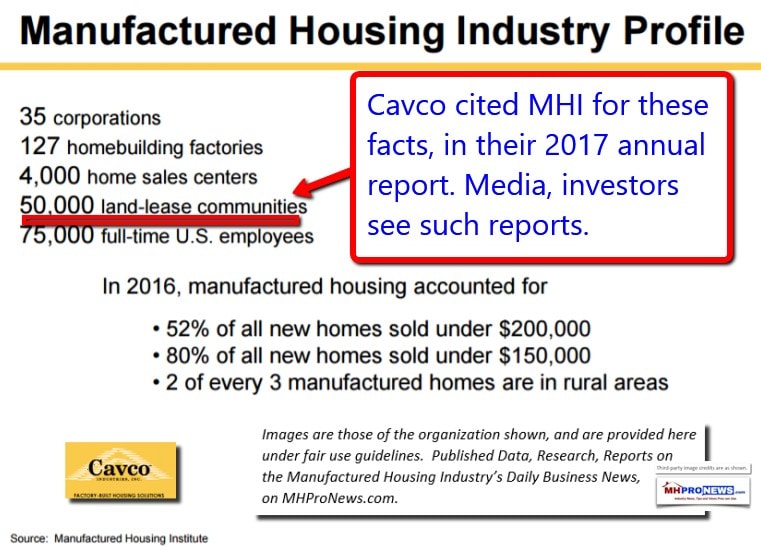
MHI used to claim that there were some 38,000 land lease communities in one graphic, while their own member Cavco Industries claimed there were 50,000 such properties, and Cavco cited MHI as the source. See the above.
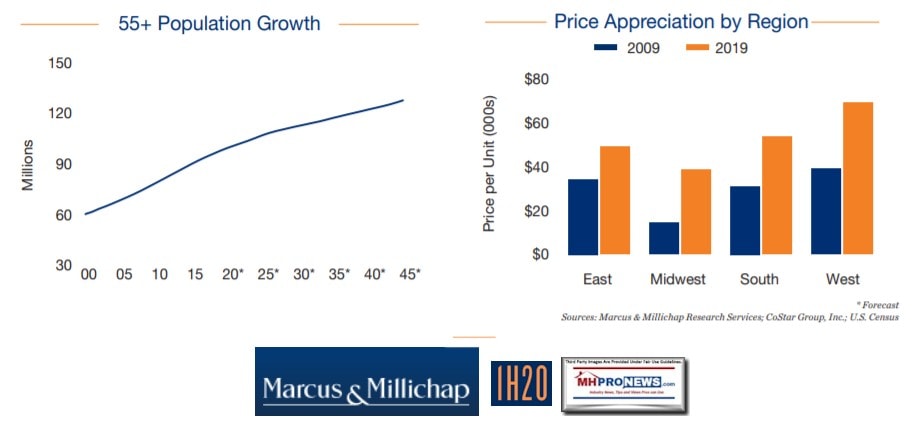
The best-known data reveals that none of the MHI community count numbers are accurate. Rolfe and company claim they have done a two year ‘hand count’ of every community that they could find, and came up with some 44,000 communities. They estimated that they might have missed perhaps 1,000. If so, then claims from circa 2000 that there were 55,000 mobile home parks and manufactured home communities would suggest that 11,000 such properties have vanished in two decades, due to closure and redevelopment.
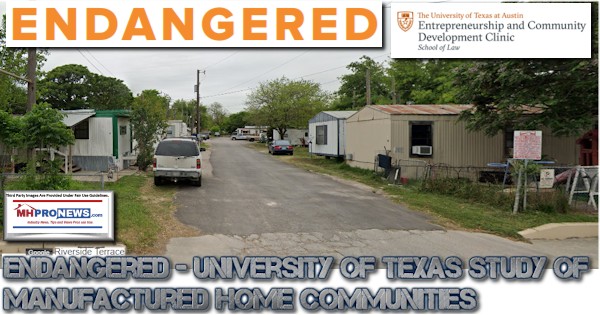
MHProNews’ fact-checks have hammered away at certain inconsistencies in MHI reports. At times without admitting error, MHI relents and adapts. At other times, they may make a change, but the change is still incorrect. See the examples above about community counts, or the amount of the contribution to the U.S. GDP that manufactured housing represents. These should not be difficult corrections for them to make.
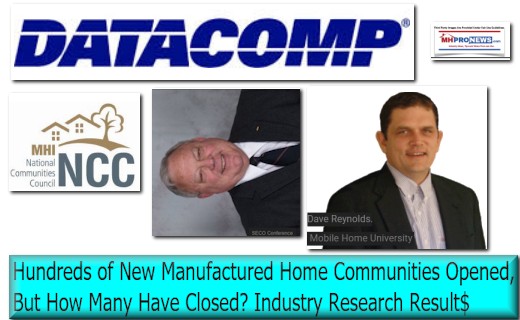
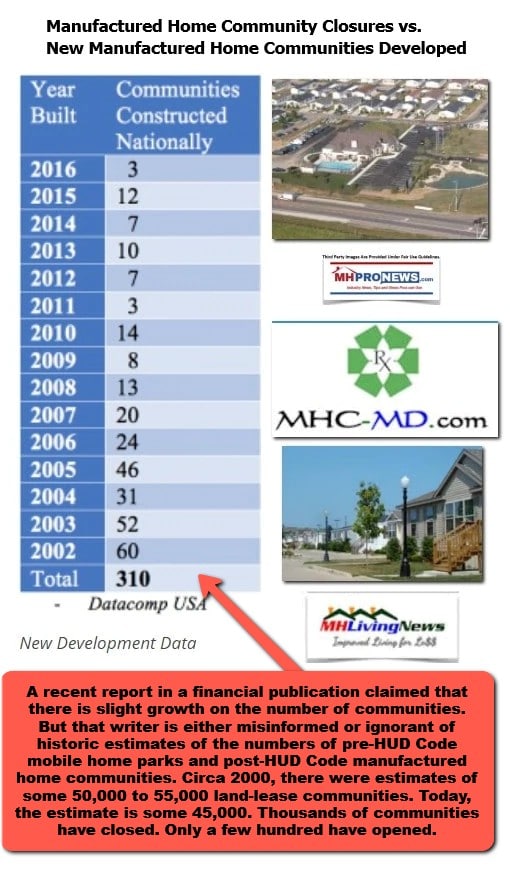
A recent report in another non-manufactured housing industry media site, cited MHI and industry members saying that the number of land-lease communities is growing. Instead, the reality is that the community count is shrinking, and that is ironically based on MHI-member data. Which begs the question: doesn’t MHI care enough to at least get a consistent piece of data?
But that question would presume that MHI is a routine trade group, which they arguably are not. The key function of MHI in recent years seems to be to promote the interests of select ‘big boy’ members, while posturing for other members that get little or no benefit. Says who? Among others, a former MHI vice president who went on to form MHARR, and a long-time MHI award winning member.
As but one more data point that reflects how tragically underperforming manufactured housing is, consider this. In 1998, manufactured homes outsold RVs some 3 to 2. By 2008, RVs outsold manufactured housing by some 5 to 1. The two industry are distinctive, and RVs are routinely ‘recreational’ and not for full time living, as their name RV – recreational vehicles – implies. RVs cost more per square foot than manufactured housing (MH) does. RVs are often a luxury item, while MH is routinely a necessity for affordable housing. So how does one explain that RVs have been successfully promoted, while manufactured housing under MHI ‘leadership’ is going in reverse?
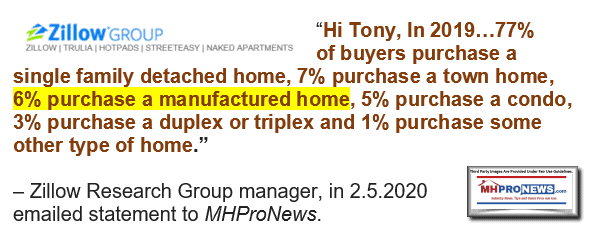

Such problems are the reasons that MHARR released a study that encouraged the formation of a new post-production trade group that they could work with to advance the interests of manufactured housing.
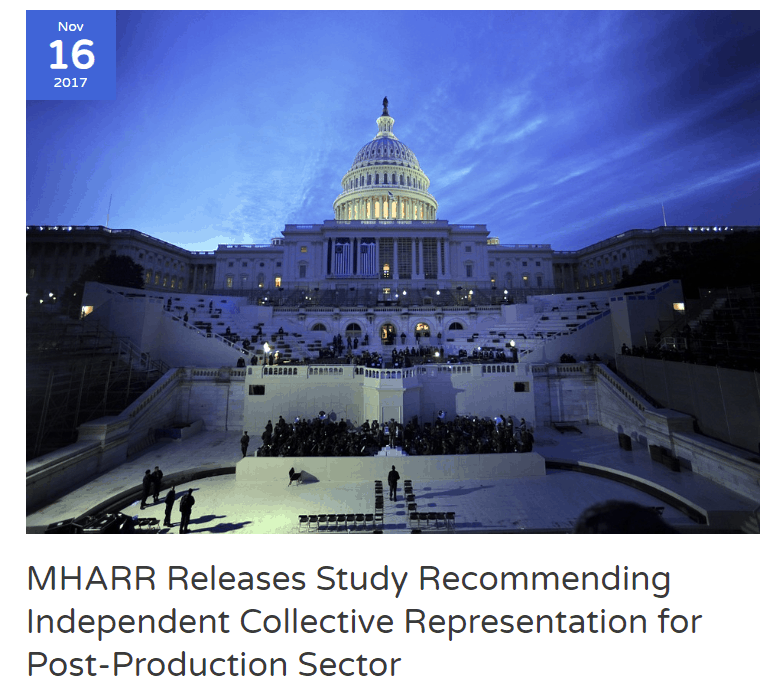
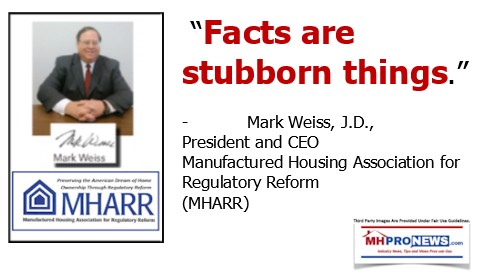
Summing Up and Conclusion
There is sadly much more that could be explored, based upon the above points. But what has been presented herein is sufficient to make a few points.
- Since Warren Buffett-led Berkshire Hathaway entered the manufactured housing industry, there has been a steady trend toward consolidation of various aspects of manufactured housing. Low industry performance has led thousands of once-prosperous firms to close or sell out at discounted valuations.
- Despite MHI’s claims that site fees – a.k.a. “lot rent” in manufactured home communities is “only” going up some 3 percent a year, there are MHI member data sources that flatly contradict that claim. So too do claims by consumer-focused nonprofit research, which includes information that Oliver’s video above referenced.
- “Bad news” seems to be a market ploy used by some brands to attract investor capital. Agree or not with President Donald J. Trump’s performance or methods, his statement quoted below is arguably accurate when applied to manufactured housing.
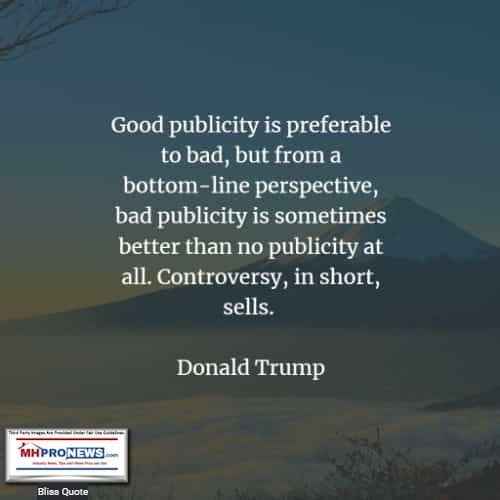
- Several, but by no means all MHI member companies could be described as ‘black hat’ brands.
- Those ‘black hat brands’ either generate their own public relations and/or use MHI, and MHI connected trade media to give them ‘cover’ and ‘respectability’ that may not otherwise be warranted.
- Despite years of promises to their smaller members, one promise after another to smaller MHI brands have gone unfulfilled. Even their ex-chairman and two of their now former presidents have said things that should be considered as cautionary notes about MHI.
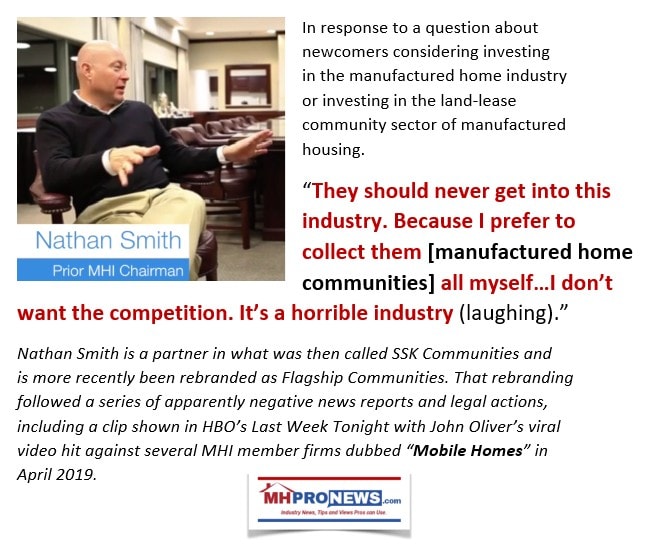
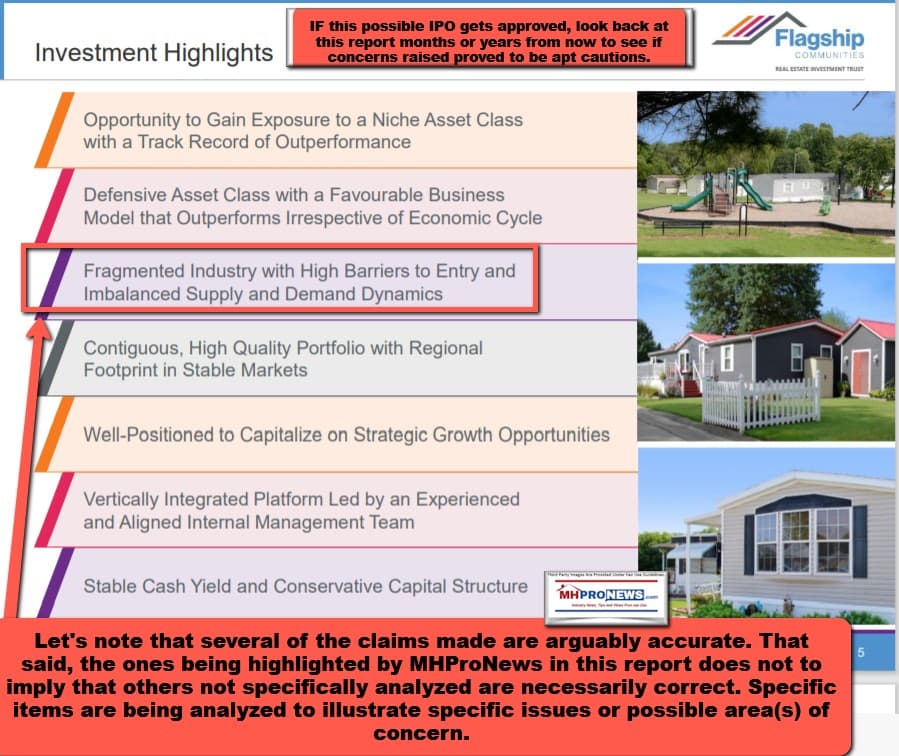
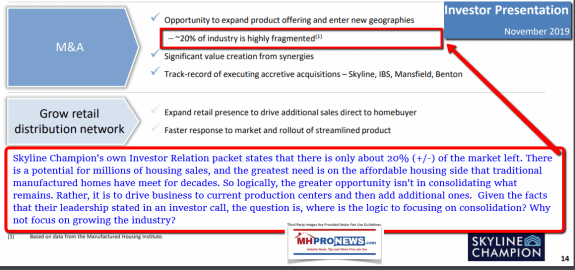
Prior MHI President and CEO Richard Jennison said numerous things at a conference a few years ago. Among them that manufactured housing could attain 500,000 new home shipments per year. If so – and we think his estimate is low – then why has MHI failed to achieve that goal? Note too that Jennison admitted, rather grudgingly in the video clip below that MHI has made mistakes. Really? No kidding…
Chris Stinebert, another previous MHI president and CEO, in his exit message to the industry encouraged fair treatment of customers and residents that focus on their interests. Stinebert correctly argued that treating home owners well would benefit them and in time the entire industry.
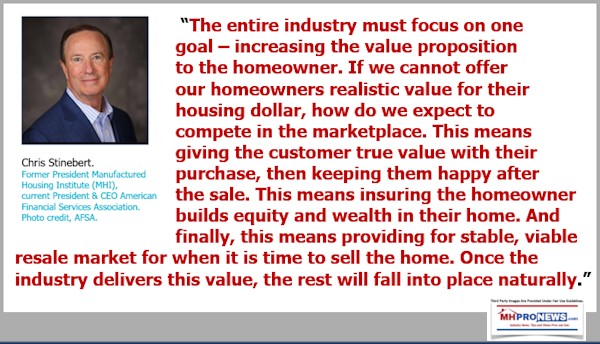
But instead, as MHBA’s Executive Director Tom Hardiman has argued, MHI has sold out their own customer base.
When public officials, mainstream media, and industry insiders alike all point to certain brands, often connected to MHI, as being problematic, that alone should be reason to carefully consider anything that MHI or key member companies with more than the typical grain of salt.
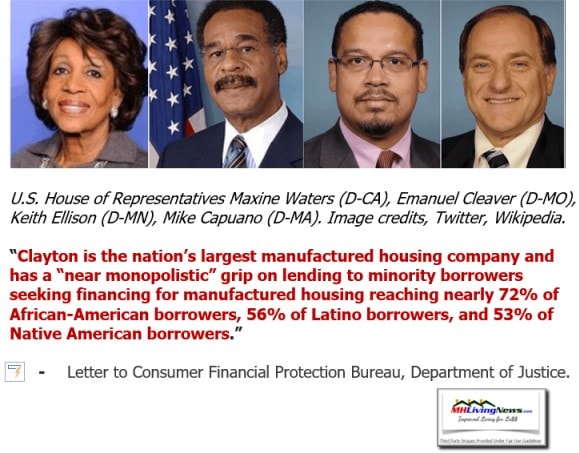
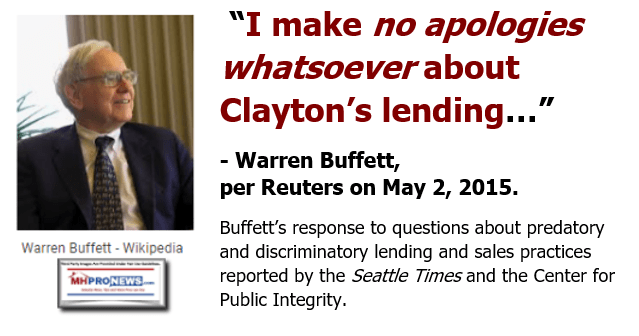
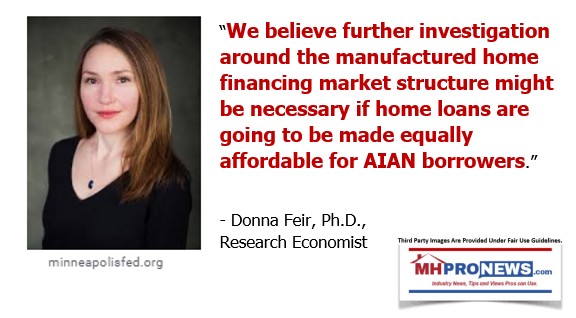
In closing, all of this is the tip of the proverbial iceberg. It should be stressed that there are numerous good white hat brands and trade groups. This should not be construed as an indictment of all of manufactured housing. Indeed, most manufactured home owners do love their homes. Numerous research reports demonstrate that point.

What decades of third-party research demonstrates is that manufactured homes perform surprisingly similarly to conventional housing and at a much lower cost per square foot.
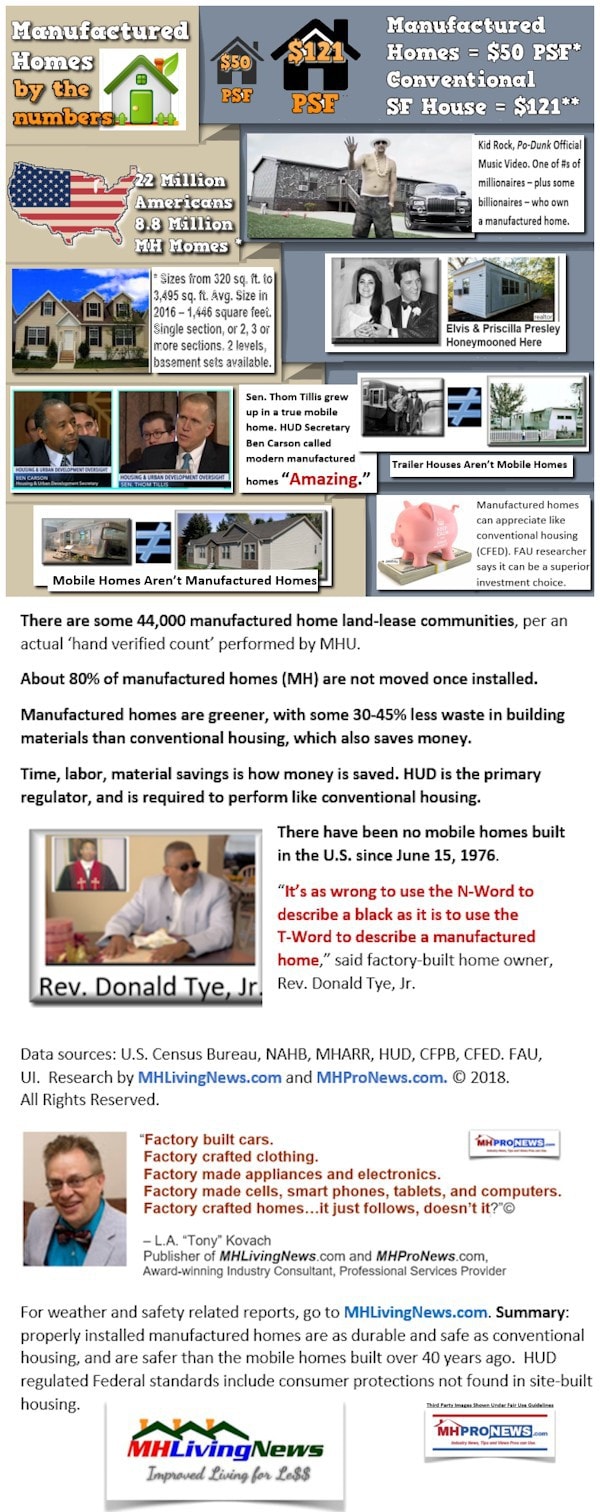
Given the affordable housing crisis, the insights from this report should be a call to action by more in the mainstream media, public officials, academics, and other researchers.
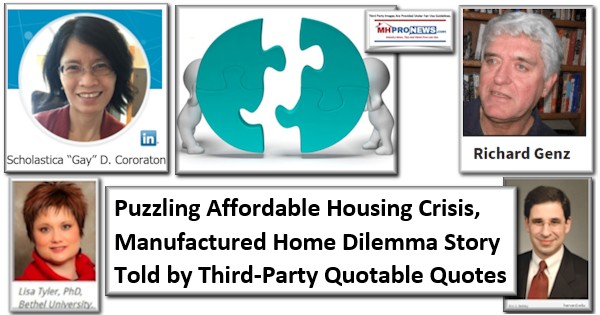
Investors and industry professionals alike should ponder anew the value of providing honest yet profitable services to potentially millions of housing seekers.
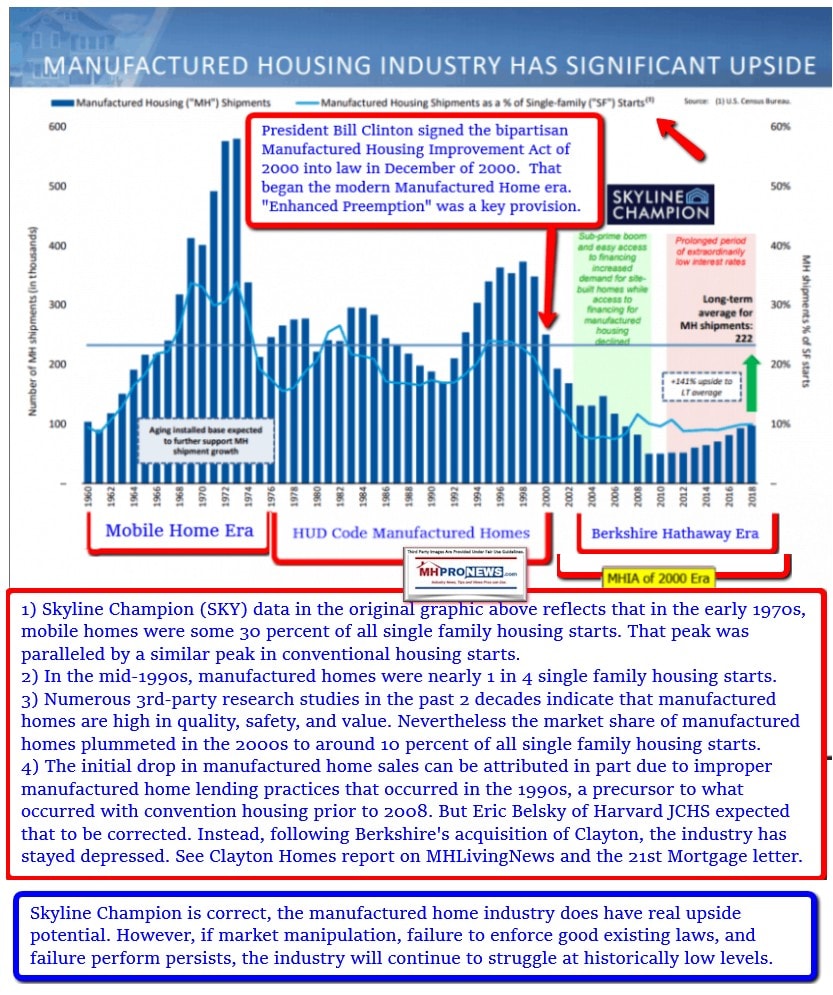
What Legacy Housing’s Curt Hodgson said below is relevant and useful. Too many in our profession are focused short-term, and are not looking at the longer-term opportunities and/or threats.
A relative few, often MHI-insider firms benefit from the problems outlined herein. Meanwhile, the vast majority are marginalized. Some do not even realize that they are being undermined from within.
MHProNews has it on good authority that several public officials are probing certain firms connected with the industry. At some point, these concerns may break through into the mainstream.
In the meantime, to learn more, see the related reports, or contact MHProNews.
A once far greater industry logically will not recover and grow to its potential until the manufactured home industry’s core issues are successfully addressed. Several of those issues are internal ones, as this report outlines.
To stay informed on key issues related to manufactured housing, sign up in seconds for our free x2 weekly emailed news updates.
There are decades of useful third-party academic, public officials, and other useful research documents that paint a generally rosy picture about manufactured homes. Regrettably, those are routinely not to be found or even mentioned on the MHI website – which begs the questions – why not?
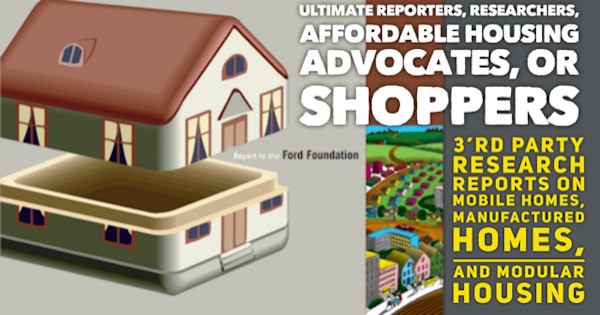
The best advice, with respect to MHI-generated information, regrettably is this. Double-check their claims with multiple industry experts, hopefully not one of their ‘key’ MHI member companies, connected bloggers-or trade publishing allies. Otherwise, you may just hear the same recycled misinformation or mix of accurate and inaccurate information.
The case can be made – as this outline reflects – that manufactured housing is misunderstood and underperforming, often for reason that can be traced back to MHI connected members and trade groups. When asked to debate or address such concerns in public, MHI routinely declines to do so. Thus, a prima facie case rests on the points raised herein.

Our industry-leading breadth of readers have said it. There is no one who covers the industry with the information or insights like MHProNews.
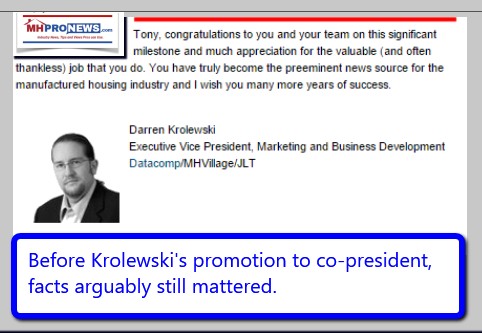
There is always more to read and more to come. Stay tuned with the runaway number one source for authentic “News through the lens of manufactured homes and factory-built housing” © where “We Provide, You Decide.” © ## (Affordable housing, manufactured homes, reports, fact-checks, analysis, and commentary. Third-party images or content are provided under fair use guidelines for media.) (See Related Reports, further below. Text/image boxes often are hot-linked to other reports that can be access by clicking on them.)

By L.A. “Tony” Kovach – for MHProNews.com.
Tony earned a journalism scholarship and earned numerous awards in history and in manufactured housing.
For example, he earned the prestigious Lottinville Award in history from the University of Oklahoma, where he studied history and business management. He’s a managing member and co-founder of LifeStyle Factory Homes, LLC, the parent company to MHProNews, and MHLivingNews.com.
This article reflects the LLC’s and/or the writer’s position, and may or may not reflect the views of sponsors or supporters.
Connect on LinkedIn: http://www.linkedin.com/in/latonykovach
Related References:
The text/image boxes below are linked to other reports, which can be accessed by clicking on them.


